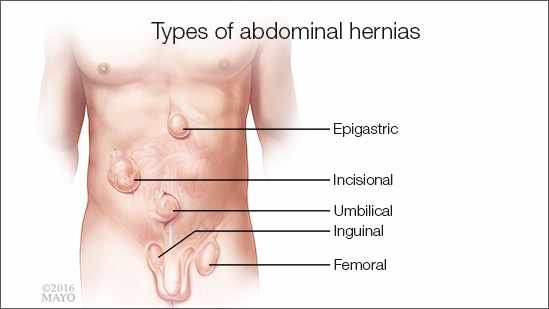-
Featured News
Mayo Clinic Q and A: Abdominal hernias do not go away on their own

DEAR MAYO CLINIC: Six months ago I was diagnosed with a groin hernia. At the time, my doctor said that eventually I'll need surgery, but it doesn't bother me, so I have not been back. Is surgery always necessary, or do some hernias go away on their own? Is it dangerous to ignore it?
ANSWER: Abdominal hernias are common and not necessarily dangerous. But, a hernia doesn’t usually get better on its own. In rare circumstances, it can lead to life-threatening complications. Consequently, surgery is usually recommended for a hernia that’s painful or becoming larger.
An abdominal hernia occurs when part of an organ or tissue bulges through a weak spot in the wall of muscle that surrounds your abdomen. Some hernias don’t cause any symptoms, and people might not even know they have one until their doctor discovers it during a routine medical exam. More often, it's common that patients can see and feel the bulge created by the hernia. The bulge is usually more obvious when you’re standing upright or straining. You might feel pain, weakness or pressure in the affected area.
There are two different types of groin hernias: inguinal and femoral. Inguinal hernias are some of the most common hernias, occurring more often in men. The weak spot is in the inguinal canal. In men, this is where the spermatic cord exits the abdomen and enters the scrotum. In women, the inguinal canal carries a ligament that helps hold the uterus in place. Often, an inguinal hernia is present at birth — especially for boys — but it may develop later in life due to factors such as aging muscles, strenuous activity or chronic coughing.
Femoral hernias are far less common and are more often seen in older women. They form along the canal that carries the principal blood vessels (femoral artery and vein) into the thigh. This hernia usually produces a bulge that’s slightly lower than an inguinal hernia.
Even though your hernia isn’t causing any symptoms, it's important that you have it regularly evaluated by your doctor. He or she will want to keep an eye on it and reassess the situation ─ even if it becomes just slightly uncomfortable. Some people wear a supportive belt or undergarment to hold the hernia in, but this isn’t a long-term solution.
Fatty tissue in the abdomen is usually the first tissue to exit the hernia. This is beneficial, because it plugs the hole. Problems arise when part of an organ ─ typically the intestine ─ pushes through the weakened muscle and becomes trapped on the outside (incarcerated). You can tell when this happens, because the hernia can’t be returned into the abdomen by application of gentle pressure. It typically causes constant discomfort.
 An incarcerated abdominal hernia may prevent passage of contents through the intestine (bowel obstruction). The hernia also may be cut off from the body’s blood supply ─ a risk that increases with age. This can lead to gangrene, a life-threatening condition requiring immediate surgical attention. See your doctor promptly if you can’t push the hernia back in with gentle pressure, or you experience increased pain, nausea, fever, swelling or darkening of the skin over the hernia.
An incarcerated abdominal hernia may prevent passage of contents through the intestine (bowel obstruction). The hernia also may be cut off from the body’s blood supply ─ a risk that increases with age. This can lead to gangrene, a life-threatening condition requiring immediate surgical attention. See your doctor promptly if you can’t push the hernia back in with gentle pressure, or you experience increased pain, nausea, fever, swelling or darkening of the skin over the hernia.
The best treatment for bothersome abdominal hernias is an operation to push back the protruding organ or tissue into the abdomen and reinforce the weakened muscles. Sometimes, this involves placing a synthetic or biological mesh against the weakened area to help with reinforcement.
Some evidence suggests that laparoscopic surgery, which involves inserting surgical instruments through several small incisions, results in quicker recovery. But, conventional open surgery may be appropriate with hernias that are larger or more difficult to treat. If you require surgery to fix the hernia, your doctor will be able to help you determine which type is best for your specific situation. (adapted from Mayo Clinic Health Letter) — Kristi Harold, M.D., General Surgery, Mayo Clinic, Phoenix







